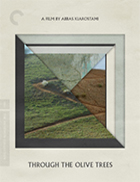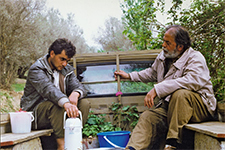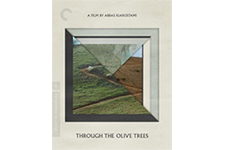| Director: Abbas Kiarostami | | Screenplay: Abbas Kiarostami | | Stars: Mohamad Ali Keshavarz (Film Director), Farhad Kheradmand (Farhad), Zarifeh Shiva (Mrs. Shiva), Hossein Rezai (Hossein), Tahereh Ladanian (Tahereh), Hocine Redai (Hocine), Zahra Nourouzi (Kouly’s Daughter), Nosrat Bagheri (Achiz), Azim Aziz Nia (Azim), Ostadvali Babaei (Teacher), N. Boursadiki (Tahra) | | MPAA Rating: NR | | Year of Release: 1994 | | Country: Iran |  |
|  Writing about Abbas Kiarostami’s “Koker Trilogy,” film scholar David Oubiña described the films as an “extraordinary series of palimpsests, where each film overwrites its predecessor.” This is particularly true of the third film in the series, Through the Olive Trees, which is the most overtly self-reflexive. It calls attention to itself as a constructed film by dramatizing the making of the previous film in the series, And Life Goes On (1992), which was itself a fictionalized account of Kiarostami’s search for two of the young boys who played roles in his earlier film Where is the Friend’s House (1987) and were possibly killed in the 1990 Manjil-Rudbar earthquake in northern Iran. Through the Olive Trees features Mohamad Ali Keshavarz playing a filmmaker (an obvious stand-in for Kiarostami) who is directing a scene with Farhad Kheradmand, who played Kiarostami’s fictional stand-in in And Life Goes On. You can see why Oubiña described the films as a series of palimpsests. Yet, of all the films in the trilogy, Through the Olive Trees is the least satisfying and engaging precisely because virtually everything interesting about it is interesting because of its relation to the other films. Where is the Friend’s House, which has no meta-qualities whatsoever, is the best film in the series—a small masterpiece of humanist filmmaking in the neorealist mode. And Life Goes On builds intrigue with its fictionalized recounting of Kiarostami’s return to the Koker region to discover the fates of the earlier film’s young actors, although its real quality is in its depiction of the resilience, sadness, determination, and resignation of those who survived the massive earthquake, but must reassemble their shattered lives in the shadow of so many deaths. The underlying drama of the natural disaster and Kiarostami’s delicate means of situating a wide variety of characters within the shattered landscape makes the film compelling in its own right. Through the Olive Trees, on the other hand, lacks its own dramatic urgency. On a purely intellectual level, it is fascinating film in relation to the others in the trilogy, but viewed on its own, it doesn’t have much to offer. A significant chunk of the film’s drama revolves around Hossein (Hossein Rezai), a local who Kiarostami hired to play a young man who got married right after the earthquake in And Life Goes On. There is tension in the scene Hossein is playing because he is in love with Tahereh (Tahereh Ladanian), the actress playing his on-screen wife, who refuses to respond to his many declarations of love and intentions to marry her in reality. Hossein discusses the situation with the film director and pursues Tahereh every chance he gets, all of which seems to be an exercise in futility. Like And Life Goes On, Through the Olive Trees ends on an extreme long shot that leaves us in a state of ambiguity; it might signal a breakthrough for Hossein or simply confirm the futility of his gestures. There are moments in Through the Olive Trees that strike with dramatic resonance, particularly some of the conversations between Hossein and the film director. Kiarostami is also clearly interested in reflecting on the nature of filmmaking, a preoccupation that is of some interest, but not enough to carry the film on its own (it also results in a certain amount of tedium, as we watch the director directing the same scene over and over and over again, an accurate depiction of the nature of filmmaking that in and of itself does not make for compelling cinema). Hossein’s romantic travails are of even less interest, which strands the film and leaves it with little outside its meta-reflective nature on Kiarostami’s previous works. Approaching it as a part of a larger whole is not without its pleasures, but on its own it has not much to stand on. | Through the Olive Trees Criterion Collection Blu-ray |  Through the Olive Trees is available as part of “The Koker Trilogy” boxset, which also includes Where is the Friend’s House? (1987) and And Life Goes On (1992). Through the Olive Trees is available as part of “The Koker Trilogy” boxset, which also includes Where is the Friend’s House? (1987) and And Life Goes On (1992). | | Aspect Ratio | 1.66:1 (all three films) | | Audio | Persian Linear PCM 1.0 monaural (all three films) | | Subtitles | English | | Supplements | Where is the Friend’s House?Homework (1989), a feature-length documentary by KiarostamiConversation from 2015 between Kiarostami and programmer Peter ScarletAnd Life Goes OnAudio commentary by Mehrnaz Saeed-Vafa and Jonathan Rosenbaum, coauthors of Abbas KiarostamiAbbas Kiarostami: Truths and Dreams (1994) documentaryVideo interview with scholar Hamid NaficyThrough the Olive TreesVideo interview with director Kiarostami’s son Ahmad KiarostamiConversation between scholar Jamsheed Akrami and critic Godfrey Cheshire | | Distributor | The Criterion Collection | | SRP | $99.95 | | Release Date | August 27, 2019 | | | COMMENTS | | All three films in “The Koker Trilogy” have been given new high-definition transfers made from the original 35mm camera negatives (Where is the Friend’s House? and And Life Goes On were transferred in 2K, while Through the Olive Trees was transferred in 4K). Of the three films, Where is the Friend’s House? is the only one to show any signs of wear and tear, as a number of scenes have vertical damage down the righthand side of the frame. It is never terribly intrusive and clearly could not be corrected without introducing additional artifacting into the image. It is primarily evidence of how Kiarostami’s films were probably not being treated and stored with the level of care they are now because he was not yet an international name in world cinema. The image still looks good otherwise, with strong detail and contrast and plenty of lively film grain. The same can be said for And Life Goes On and Through the Olive Trees, both of which look slightly sharper and more polished. The monaural soundtracks for the first two films in the trilogy were transferred from the 35mm soundtrack negatives, while the soundtrack for Through the Olive Trees was transferred from the 35mm magnetic tracks. All were digitally restored and sound fine. The supplementary material spread across the three discs in the set is quite impressive. On Where is the Friend’s House? we have Abbas Kiarostami’s feature-length 1989 documentary Homework, which has been transferred from the original 16mm negative. In the film, Kiarostami interviews parents and their children at the Martyr Masumi Grade School in Tehran. The disc also contains a 2015 interview with Kiarostami by film programmer Peter Scarlet that was recorded in Toronto (a year before Kiarostami passed away). The And Life Goes On disc includes an informative new audio commentary by Mehrnaz Saeed-Vafa and Jonathan Rosenbaum, who together wrote Abbas Kiarostami, which was just published in an expanded second edition in 2018. Through the commentary they offer lucid insights into the film’s style and its place in Kiarostami’s career. Also on the disc is Abbas Kiarostami: Truths and Dreams, a nearly hour-long documentary from 1994 by Jean-Pierre Limosin that was originally broadcast on French television as an episode of Cinema, de noire temps. Finally, there is a 15-minute interview with Hamid Naficy, author of A Social History of Iranian Cinema in which she talks about Kiarostami’s place in the “New Iranian Cinema.” The third disc in the set, Through the Olive Trees, features a 15-minute interview with the director’s son, Ahmad Kiarostami, who offers personal insight about his father’s experiences making the films in the Koker Trilogy, and a 20-minute conversation between Iranian film scholar and documentarian Jamsheed Akrami and film critic Godfrey Cheshire, who recently published an anthology of interviews titled Conversations With Kiarostami (2019). |
Copyright © 2019 James Kendrick Thoughts? E-mail James Kendrick All images copyright © The Criterion Collection |



 (2.5)
(2.5)

 Through the Olive Trees is available as part of “The Koker Trilogy” boxset, which also includes Where is the Friend’s House? (1987) and And Life Goes On (1992).
Through the Olive Trees is available as part of “The Koker Trilogy” boxset, which also includes Where is the Friend’s House? (1987) and And Life Goes On (1992).